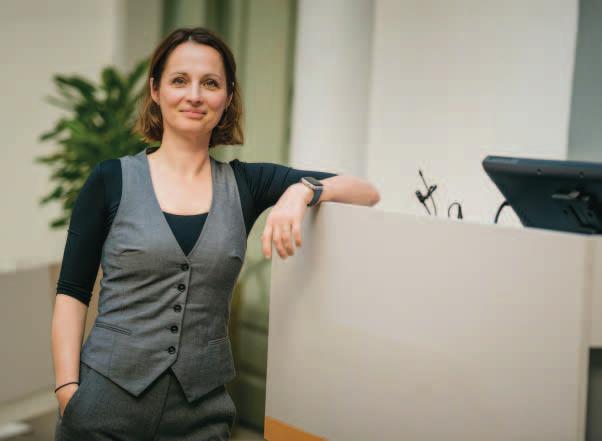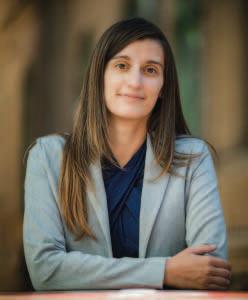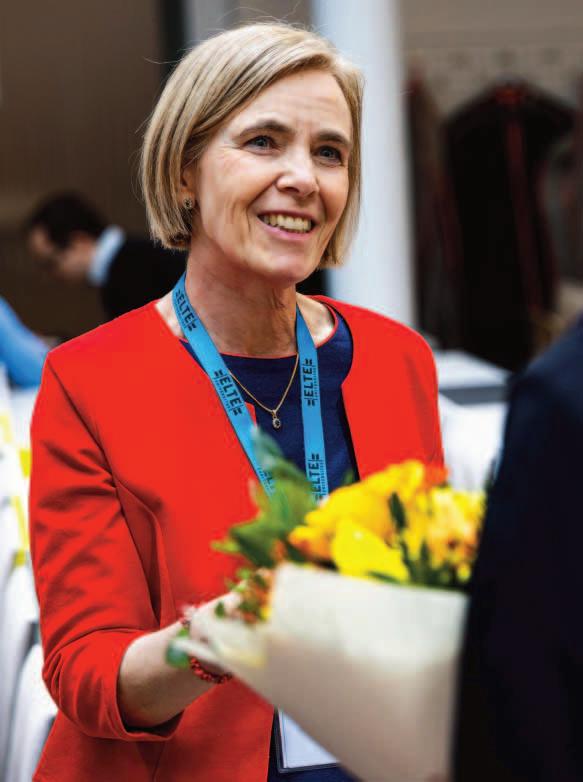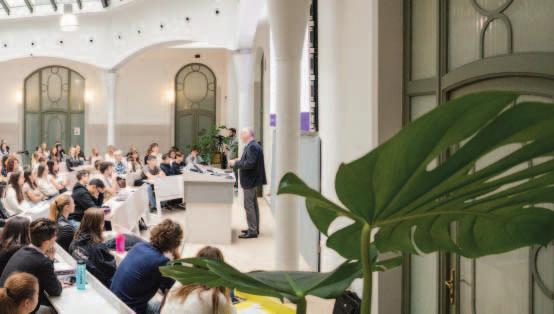FUTURE IN FOCUS
ELTE
STUDIES

WHY CHOOSE ELTE FACULTY OF ECONOMICS? WHY STUDY BUSINESS AND ECONOMICS? ADMISSIONS AND ENTRY-SCORE GUIDELINES


AND INNOVATIVE LEARNING



THE FUTURE, YOU & ELTE

IF YOU GRADUATE NEXT YEAR, YOU HAVE A BIG DECISION TO MAKE IN 2026: WILL YOU WORK OR CONTINUE YOUR EDUCATION? IF THE LATTER, WHICH PROGRAMME AND WHICH UNIVERSITY WILL YOU APPLY TO? THE DECISION IS NOT ONLY ABOUT EDUCATION BUT ALSO ABOUT CHOOSING A CAREER AND A VISION FOR THE FUTURE. YOU NEED TO CONSIDER WHAT YOU WANT OUT OF LIFE AND WHAT THE WORLD WILL EXPECT OF YOU IN 2029.
The labour market will not only need graduates in science and technology, engineering, information technology, medicine and nursing, but also wellprepared economics professionals (managers, marketers, financiers, economists) and businesspeople who can expect to earn high incomes. All this offers today's Generation Z great opportunities and chances to make our world a better and more responsible place.




WHY ELTE?
According to the excellence of the students by ranking, ELTE is Hungary's highest-rated university. The value of the degrees awarded by ELTE reflects the excellence of its teachers and students, the professional quality of its courses and the academic achievements of the university community. This is reflected in several prestigious international rankings, which place ELTE in the top 2% of universities worldwide.
WHY CHOOSE ECONOMICS PROGRAMMES?
First, consider the important role that the economy plays in the way the world works. Every day, millions of decisions are made by businesses that have a huge impact on our lives, what we eat, how we travel or even what technologies we use.
An education in economics allows you not only to understand these processes, but also to be an active part of them. It is a world full of exciting problems, and those who understand them can have a huge impact on changing the world. With an economics degree, you can work almost anywhere in the world. Business degrees are universal, and the skills they teach - such as analytical ability, strategic thinking, leadership and communication - are valuable everywhere.
In addition, graduates with an economics degree are generally in demand in the job market, and business positions are some of the highest-paid jobs in the world, where newcomers can expect not only a higher income, but also a predictable career path with a well-planned future.
WHY CHOOSE ELTE'S FACULTY OF ECONOMICS?
ELTE's Faculty of Economics is one of the leading institutions in Hungarian higher education. Its master's programmes in economics are among the best in the country, and its bachelor's programmes are among the best in their field.
▶SPECIFICS OF THE PROGRAMME:
The first three semesters of the Faculty's undergraduate programmes focus on business fundamentals (economics, management, accounting,


corporate finance, law, marketing), so you can easily switch to another programme at no cost.
You can also study the courses in English at no extra cost, and you can get an assessment during the semester to help you plan your exams. In addition, video recordings of lectures and seminars allow you to study flexibly and efficiently.
▶HIGH-QUALITY EDUCATION AND PRACTICEORIENTED
TRAINING:
At ELTE GTK, you can acquire both theoretical knowledge and develop your practical skills. Special emphasis is placed on skill-based subjects such as persuasion, negotiation techniques, and marketing communication, as well as on project work and corporate training sessions that focus on solving real-world problems. You will also explore the potential uses of artificial intelligence in learning and in the workplace, including project assignments and your thesis. You will learn from renowned teachers and guest speakers from the business world who have extensive practical experience. This means that you can prepare for the challenges of your future career during your university studies.
▶
INTERNATIONAL CONNECTIONS AND OPPORTUNITIES:
ELTE GTK works with several international partners, so you can study abroad, do an international internship or even take part in international projects through Erasmus+ or agreements with foreign universities. This is especially important if you want to work abroad later, as it gives you the opportunity to learn about the global economy and gain work experience abroad while you are still at university.
▶FLEXIBLE CAREER OPTIONS:
After completing your Bachelor's degree at ELTE GTK, you are welcome to change direction during your Master's degree if you feel you want to try something different.
▶
EXCELLENT CAREER PROSPECTS:
A degree from ELTE GTK is competitive in the job market both at home and abroad. Our graduates excel in the international business environment, are prepared to take on leadership roles and will be in management positions within a few years. With the knowledge you gain here, you can apply for international jobs as this degree is widely recognized and valued worldwide.



START YOUR FUTURE WITH 9 VALUES OF ELTE GTK'S BACHELOR’S PROGRAMMES
DIVERSE UNIVERSITY: VERSATILE DEVELOPMENT OPPORTUNITIES – CREATIVITY
To achieve versatility, in addition to a thorough preparation in your field of study, we also focus on developing your communication skills, legal, psychological, social, IT and socio-environmental knowledge, so that you become an open-minded, creative person. In addition, the diversity of ELTE allows us to learn from some of the best professionals in the country.
YOU CAN CHANGE YOUR DEGREE FREE OF CHARGE
Now you may not know which direction is ideal for you. At ELTE, we'll give you time to explore the core business areas and then decide. The first years of our four bachelor’s programmes have many common components, so you can easily switch to another programme if you prefer. You'll also be able to move on to a master's degree, as you can progress from any of our core courses to one of our six nationally-ranked master's programmes.
WORLD-CLASS EDUCATION –TECHNOLOGY TO HELP YOU LEARN
At ELTE, high-tech educational technology, unique in Hungary, supports your learning. Such resources can only be found at the world's top universities abroad all classrooms are equipped with modern LED screens, projectors, cameras, sound systems and electronic whiteboards. Classes are video recorded and you can watch them in the Video Library, with some available for viewing from home as well. In the high-tech Examination Centre, you can take your tests and exams in the familiar digital environment at your preferred times.
You cannot use artificial intelligence for exams, but you can use it for your coursework and assignments. Learning how to work with AI is an important part of your studies: you’ll get to know different applications, practice good prompting techniques, and learn how to handle the potential risks of AI use in a responsible way.
YOU CAN STUDY EACH COURSE IN ENGLISH OR HUNGARIANACCORDING TO YOUR KNOWLEDGE AND PREFERENCES
You don't have to choose between a fully English or Hungarian programme, because we let you choose the language in which you want to study, depending on your language skills, level and interests.
You can learn both the profession and the language at the same time, without extra cost or time, and you can continue to improve your English. By the time you graduate, English will be your working language and you will be able to work or study for a master’s degree anywhere in the world.
8 FOREIGN LANGUAGES
GTK's Language Learning Programme currently offers scholarships for the study of eight languages – English, French, German, Italian, Spanish, Chinese, Japanese and Korean. English is a prerequisite for a successful career, but it's other foreign languages that give you a real competitive edge, both when studying abroad and in international companies.
SEE THE WORLD, GAIN INTERNATIONAL EXPERIENCE
European exchange programmes (such as Erasmus+), of which ELTE remains a member, allow you to travel to many EU countries for 1-2 semesters of part-time study or work placements. In addition, bilateral agreements with more than 200 universities around the world allow you to become an exchange student at a number of major universities outside Europe, from Japan to the USA. International experience is particularly important if you want to study or work abroad.
AN INSPIRING COMMUNITY AND A LIMITLESS CHOICE OF STUDENT ACTIVITIES
High entry standards mean you'll study with excellent students like you. Highly capable, well-prepared, motivated
students inspire and support each other and are generally very creative.
You're sure to find your place in the diverse student body of a diverse university. In addition to the rich programme of student organisations in the faculty, you can also take the initiative in any activity you like through the Voluntary Groups.
A PRESTIGIOUS UNIVERSITYA RENOWNED DEGREE - HIGHLY QUALIFIED GRADUATES
ELTE is the best-known and most respected Hungarian university internationally. ELTE's degree is highly valued by employers, who welcome its graduates not only at home but also abroad. This is because new ELTE graduates are talented and well-prepared students who have learned from outstanding teachers with extensive practical experience.
PRACTICAL KNOWLEDGEA SUCCESSFUL CAREER START
Our programmes not only give you theoretical knowledge and a broad perspective, they also develop your practical skills, ensuring an excellent start to your career.
With professional preparation, English language skills, communication, argumentation, persuasion, presentation skills, work culture, creativity, practical problem-solving skills acquired
through project assignments and corporate training, you can start your career in top national and international companies or start your own business.
A degree from ELTE GTK is competitive in Hungary and internationally. Our graduates excel in international business environments, are prepared to take on managerial responsibilities and within a few years will be working in a managerial role. With the knowledge you gain here, you can apply for international jobs and be successful anywhere.
Our practice-oriented training courses directly connect university studies with the world of business, with our lecturers coming from that very field. Business simulations introduce students to corporate thinking and decisionmaking, while career management helps them to enter the job market with confidence and awareness.
IMPRESSUM
Future in focus – The ELTE Faculty of Economics information brochure
Editors: Zoé Szabó and Krisztina Bence-Kiss, PhD
Graphic design: Zoltán Áprili / Orlando Stúdió Kft.
Contact: ELTE Faculty of Economics 1088 Budapest, Rákóczi út 7.
Web: gtk.elte.hu
For electronic contact scan the QR code:


WHICH BACHELOR'S PROGRAMME SHOULD YOU CHOOSE?

BACHELOR OF ECONOMICS AND MANAGEMENT
If you're interested in running a business, making strategic decisions and want to try your hand at management in the future, the Bachelor of Economics and Management could be the right choice for you. It provides a broad foundation for understanding business processes and developing leadership skills. You will learn how businesses work, the rules of working in projects, groups and organisations, and how to make business decisions and solve problems.
With a diploma in hand, you will know the basics of marketing and business law. You will also be able to interpret financial statements and prepare financial analyses. Your practical knowledge will enable you to manage people, teams and processes in organisations, i.e. to plan, organise, manage and lead.
▶ INTERNATIONAL CAREER OPPORTUNITIES: This qualification is highly valued by multinational companies, especially if you speak several languages and have experience in international project management.
THIS CHOICE IS NOT ONLY ABOUT EDUCATION BUT ALSO ABOUT EMBRACING A CAREER PATH AND A VISION FOR THE FUTURE. YOU NEED TO THINK ABOUT WHAT YOU WANT OUT OF LIFE AND WHAT THE WORLD WILL EXPECT OF YOU WHEN YOU GRADUATE IN 2029. WITH AN ELTE DEGREE AND EXCELLENT ENGLISH SKILLS, YOU WILL BE IN DEMAND NOT ONLY IN YOUR HOME COUNTRY, BUT ALSO IN MULTINATIONAL COMPANIES OR ABROAD, WHERE YOU WILL HAVE THE CHANCE TO FIND GREAT POSITIONS – WITH EVEN BETTER EARNING OPPORTUNITIES.

BACHELOR OF TRADE AND MARKETING
If you are interested in the world of market trends, consumer behaviour and creative marketing campaigns, a Bachelor of Trade and Marketing could be the right path for you. Based on a broad and deep understanding of the consumer and the marketplace, this programme introduces you to the tactical and strategic tools of marketing that can be integrated into a successful brand strategy in any environment, from small businesses to multinational corporations.
You'll learn how to build brands, communicate effectively with your target audience, and increase a company's sales performance. You will learn about the latest marketing techniques, platforms and channels and how to use them to implement your strategy.
General management, finance and accounting knowledge and leadership skills will enable you to succeed as a manager. With a degree from this programme, you will be able to operationally and creatively manage a company's marketing activities, reason and negotiate at a high level, present professional proposals persuasively, and analyse and evaluate changes in the market environment and consumer behaviour.
▶INTERNATIONAL CAREER OPPORTUNITIES: Marketing is an international language and your knowledge of marketing and data-driven decision making is valuable globally. If you understand search engine optimisation, social media and digital analytics, generative artificial intelligence applications for marketing, you can seek employment anywhere in the world. A high level of local language skills is usually essential in marketing.

BACHELOR OF FINANCE AND ACCOUNTING
If you love numbers, analysis and precision, then the Bachelor of Finance and Accounting is for you. You'll learn about financial analysis and reporting, auditing, taxation and the basics of how financial markets work. This degree gives you a solid start in any financial field, whether it's banking, accounting and auditing, insurance or investment. Upon graduation, you will be able to find work immediately as a financial analyst, controller, planner or investment manager, accountant, auditor, or chartered accountant in national and international companies, in the banking and insurance sectors, in brokerage houses, in investment, even in a highly paid managerial position in a few years' time.
The course is accredited by the ACCA (Association of Chartered Certified Accountants), the world's largest professional body for finance and accountancy, and you can take 5 ACCA modules, giving you a significant advantage over other programmes.
▶INTERNATIONAL CAREER OPPORTUNITIES: Financial services are in demand globally, and knowledge of International Financial Reporting Standards (IFRS) is particularly valuable. If you want to work in major financial centres such as Frankfurt, London, New York or Paris, this degree will provide you with the necessary foundation and ACCA certification. However, in addition to English, it is also useful to learn the local language in order to apply successfully abroad.

BACHELOR OF INTERNATIONAL BUSINESS ECONOMICS
The Bachelor of International Business Economics prepares you for global business. If you are interested in international trade, global logistics or the world of international investment, this is the programme for you. You will learn how global markets work, how to manage a company's international operations and how to meet the challenges of the international business environment. In addition to the key management, financial, communication and legal aspects of running a business, you will learn about international market and business processes, international organisations and regional integration, the major trends shaping the world economy and the economic, political and cultural impact of globalisation. You will be able to work in strategic purchasing, logistics or sales for companies operating in the global marketplace, as well as in EU, international and governmental organisations.
▶INTERNATIONAL CAREER OPPORTUNITIES: The demand for global markets continues to grow, and graduates with a degree in International Business Economics have particularly good opportunities to apply for jobs in multinational companies, international organisations or even government institutions that deal with global economic activities. In these cases, knowledge of languages other than English is usually expected.
FUTURE I FUTURE I

RULES FOR BACHELOR'S ADMISSION SCORE CALCULATION
The same rules apply to all bachelor's programmes at Faculty of Economics of ELTE, with no differences in the number of points awarded for graduation, the institutional points for each programme, or the additional points awarded by law.
Detailed information on the score calculation system can be found in Hungarian on our faculty website: https://gtk.elte.hu/pontszamitas2026 or by scanning the QR code here:

HOW TO CHOOSE A SUCCESSFUL FUTURE THAT BRINGS JOY, PROGRESS AND SATISFACTION?
▶KNOW YOURSELF: Before you make a decision, think about what is really important to you. Do you like the world of numbers or do you see yourself in a more creative field? Do you like managing people or would you rather be an analyst? Self-awareness is the key to choosing a career that will make you happy in the long term.
▶THINK ABOUT WORK-LIFE BALANCE: Careers that offer the possibility of working from home or flexible hours may be particularly attractive if you want to travel or start a family later in life.
▶ THINK ABOUT YOUR FUTURE OPTIONS: see what career opportunities your chosen programme offers and what you can expect to earn after graduation. Also think about the extra opportunities that an international career could offer you!
▶LOOK FOR LONG-TERM DEVELOPMENT: There are always new trends, technologies and methods in business, so if you're open to learning, you'll always have the opportunity to progress.
IN FOCUS IN FOCUS

HOW CAN YOU PREPARE FOR LIFE AFTER UNIVERSITY?
▶STAND OUT FROM THE CROWD: During your university years, you will have many opportunities to become more than just a job seeker. At ELTE GTK, you can participate in a Scientific Students’ Associations (TDK), where you can analyse and present real business problems to a professional jury, and academic societies and volunteer circles are all designed to broaden your knowledge in a variety of fields, both in theory and practice.
▶BE A GLOBAL CITIZEN: These days it's hard to succeed without good language skills and the ability to be comfortable in an international environment. In our faculty, we support all students to learn English, French, German, Italian, Spanish, Japanese, Chinese and Korean, and you can develop your skills in the real world during a semester or internship at a partner university abroad.
▶BUILD YOUR NETWORK: Connections are extremely important in the business world. It is worth attending professional events and conferences during your time at university and building up your network of contacts. This can be an advantage not only at home but also in your international career.
IS IT MORE DIFFICULT AS A WOMAN?
The business world is still dominated by male workers and managers, and men earn much more (around 2425%) than women in the same jobs and with the same experience. But the glass ceiling is not impenetrable: business is increasingly open to women, the pay gap is closing in many professions, women are entering management positions, and many international companies expect a good proportion of women in different roles and at different levels - it is no coincidence that a significant proportion of business graduates are women. Women are advancing in all areas, and you can be part of the change. However, it is important to be prepared and to build your career consciously.
▶DON'T FEAR THE COMPETITION: Competition in business can be fierce, but don't let that put you off. Be confident and believe in your skills and abilities! The best foundation for confidence is when you feel you have done everything you can to be prepared in your field.
▶NO SUCH THING AS ‘NOT FOR YOU’: Although many people say that business is for men, this is not true at all! There are many skills, such as soft skills and interpersonal relationships, that women master more easily. If business feels like your world, don't let anyone talk you out of it!

autumn 2025. The goal remains the same: to bridge the gap between academic knowledge and labour market skills, so that students can move on to the next stage of their studies or career with real-world experience, confidence and connections.
BUSINESS SIMULATIONS AND CASE STUDIES – WHEN THE UNIVERSITY CLASS BECOMES
CORPORATE TRAINING
The unique feature of the Business simulations and case studies course is that it resembles intensive training sessions rather than a lecture. Students spend two full days working with company experts, who bring real business
WHEN BUSINESS MOVES INTO THE CLASSROOM: OUR PRACTICE-ORIENTED CORPORATE TRAININGS
DURING THEIR STUDIES, OUR UNDERGRADUATE STUDENTS CAN BUILD A PORTFOLIO OF NEARLY 300 COMPULSORY AND ELECTIVE COURSES, WITH THE HELP OF OUR 60 LECTURERS, WHICH PREPARES THEM FOR ENTERING THE WORLD OF BUSINESS. IN ADDITION TO HIGHLY EXPERIENCED LECTURERS AT GTK, PROFESSORS FROM OTHER ELTE FACULTIES ALSO CONTRIBUTE TO OUR STUDENTS’ EDUCATION. ON TOP OF THAT, STUDENTS FROM ELTE'S FACULTY OF ECONOMICS ARE OFFERED COURSES THAT CONNECT UNIVERSITY STUDIES WITH CORPORATE PRACTICE – LED BY TOP BUSINESS LEADERS FROM THE COUNTRY SHARING THEIR PERSONAL KNOWLEDGE AND EXPERIENCE WITH THE BUSINESS LEADERS OF TOMORROW.
The Business simulations and case studies course introduces students to the world of corporate thinking and decision-making, while the Career management course helps them enter the job market wellprepared and confident. Those who enrol in these courses not only gain credits, but also real-life experience and a competitive edge that shape their future career path.
In recent semesters, these practice-oriented trainings have been among the most popular electives at the Faculty. The feedback is clear: students found it particularly valuable to encounter real corporate problems and receive guidance directly from business professionals. In response to the positive feedback, the Faculty will expand the course in


situations and current challenges to the sessions. In solving these challenges, participants work in teams, make presentations, discuss and formulate proposals, using the same skills that will later be required in the workplace.
One of the course's big advantages is that it represents a wide range of industries and work cultures. Companies from the banking and accountancy sectors demonstrate the logic of decision making through financial and accounting problems, and they also cover areas such as strategic management, creative business solutions and entrepreneurial thinking. Multinational companies run English-language courses, helping students develop their international communication skills. As a new addition, an artificial intelligence-focused course is also available, exploring the latest trends in digital transformation.
CAREER MANAGEMENT –CONFIDENCE AND CONSCIOUS CAREER PLANNING
Alongside Business simulations and case studies, the Faculty's other flagship course is Career management, which supports students as they start their career and enter the workforce. While the Business simulations and case studies course is based on business problem solving, the Career management classes focus on students' personal preparation: how to maximize their strengths, find the best career direction for them and how to be confident in their first job interviews.
These courses are also in training format, requiring two full days of intensive participation. The English language course is especially useful for those considering an international career or studying abroad, as both the professional content and the interview situations are conducted in a foreign language. During the training sessions, students engage in self-awareness exercises, and learn job search skills: how to build an effective CV, how to write a cover letter that will attract employers, and how to stand out in an interview situation.

The power of the practical courses lies in the knowledge students acquire, as well as in the opportunity to meet key business leaders in person. These experiences provide inspiration, open new perspectives and help students to set out on their career paths with confidence.
“SOMETIMES IT'S AN UNEXPECTED DECISION THAT BRINGS THE GREATEST SUCCESS”
— FROM INTERNATIONAL BUSINESS TO THE ACADEMIC WORLD –A CONVERSATION WITH ÉVA FAZEKAS, PHD, LECTURER IN MANAGEMENT AND BUSINESS LAW

AMONG THE SPEAKERS AT THIS YEAR'S ELTEFEST WAS ÉVA FAZEKAS, PHD, LECTURER IN THE DEPARTMENT OF MANAGEMENT AND BUSINESS LAW, WHO PRESENTED THE CAREER OPPORTUNITIES AVAILABLE IN INTERNATIONAL BUSINESS. BASED ON HER PERSONAL EXPERIENCE AS A LAWYER IN A LARGE INSURANCE COMPANY, SHE WORKED FOR A LONG TIME IN A MULTINATIONAL ENVIRONMENT, INCLUDING SEVERAL YEARS IN GERMANY. HE JOINED THE TEACHING STAFF OF ELTE GTK IN 2022, OPENING A NEW CHAPTER IN HIS CAREER.
You have moved from a successful international career to university teaching. What was behind your decision? My story is indeed diverse, and perhaps I am lucky because I have been able to work in different fields. I graduated as a lawyer and my first job was at the headquarters of an international insurance company in Hungary. At first, I only worked on small international projects, but gradually I was given more and more serious assignments. One of the most
significant steps in my career was when I applied for a project manager position at the company's headquarters in Germany. It was a big challenge, as it meant moving abroad for three years, but I felt it was an opportunity I couldn't pass up. I managed to win the application and spent nearly three years in Germany. I ended up returning home for family reasons, which was also the reason behind my move from business to academia.
What was it like working in Germany?
Our office there was incredibly diverse: thirteen of us working together from ten different countries on three continents. I loved this kind of cultural diversity because everyone brought their own background, their own working culture and we could learn from each other. It gave me a huge professional and personal development opportunity. Of course, it wasn't easy at the beginning. Going abroad alone in my twenties, without family and friends, was definitely a challenge. I felt a bit lost in the first few months, but fortunately the international environment and the fact that all my colleagues were in a similar situation made it easier to adapt. This period also helped me to find my place in the professional world and to realise that I could also cope in a global business environment.
What was the working language? Did you need to speak German?
Even though I lived in Germany and needed some German language skills for everyday life, we communicated exclusively in English at work. My colleagues were all from different countries, so English was our common language.
And how did the opening to the academic world come about?
At first, my life at home was completely focused on family, but after a while I felt I wanted an intellectual challenge. That's when a former classmate of mine approached me about doing a PhD. The kids were a bit older at the time, so I started doing some academic work. At first, I only taught business law to foreign students in English for a few hours a week, but I soon realised how much I loved teaching. When I finished my PhD, I saw that they were looking for a lecturer for the business law department at ELTE. The deadline for applications was the same day I was defending my PhD dissertation and I thought why not give it a try. I applied and to my great delight I was accepted. I was very happy because it gave me a career opportunity that allowed me to use my professional skills while spending more time with my family. This opened a new chapter in my life, which fitted in perfectly with my previous experience, but also brought new challenges.
You teach a lot of classes, also in English, has many students with projects and thesis. What do you like to do when you're not working - what is your leisure time? Mainly folk dancing. I've been dancing since I was a kid and it's not just a hobby, it's a complete form of recreation. Folk dance helps me to get into a completely different environment and get away from everyday life. Movement in
general also plays an important role in my life. My family and I cycle and hike regularly, and we try to get our children active. I also do running and yoga, because these forms of exercise help to relieve tension and recharge my batteries.
In her presentation, she looked at career opportunities in international business. What do you think is the biggest challenge facing young people starting out in their careers today?
The biggest challenge I see is that young people have to find a balance between career development and personal life. When I was working in insurance, I loved my job, but when it came time to start a family, I felt that I couldn't do it with the same intensity as before. That's why I decided to change and go into academia. Not everyone has to make this choice, as many women are able to successfully balance family and career. In my eyes, success does not necessarily mean getting to the top. I think a successful career is one where you find your own way and where you are happy to work. It can also be successful if you are not in a managerial position, but working in a field where you feel comfortable and where you are fully fulfilled. In today's world, there is enormous pressure to get as far and as fast as possible in their careers, but at the same time their personal life cannot be left behind. In the business world, competition is particularly fierce and the international working environment is increasingly common, placing even higher expectations on students. It is therefore important that they learn how to manage their time, prioritise their tasks and not try to achieve everything at once. Patience and flexibility are key, and I always advise them not to be afraid to take risks and try new things.
As a successful woman, what would be the most important piece of advice you would give to girls who are just starting to plan their career in the business world?
Never stop learning. The business world is constantly changing and there will always be new challenges to adapt to. Learning new skills, continuous self-development and flexibility are essential to be successful. Language learning is essential. I think it is now essential to speak several languages. One language is simply not enough. If I were starting again, I would invest even more time and energy in learning a second or third language. A semester or a year abroad not only improves their language skills, but also helps them to become more open to other cultures and ways of working. And perhaps one more thing: don't be afraid to try new things and take risks. We never know what will really inspire us, and sometimes it's an unexpected decision that brings the greatest success.
THRIVE IN THE AI-DRIVEN WORLD
THOUGHTS FROM ONLINE MARKETING SPECIALIST DR KRISZTINA BENCE-KISS ON ARTIFICIAL INTELLIGENCE

ACCORDING TO THE ASSISTANT PROFESSOR OF THE DEPARTMENT OF MARKETING AND ARGUMENTATION THEORY, ARTIFICIAL INTELLIGENCE DOES HAVE A PLACE IN THE WORLD – WHETHER IT IS IN EDUCATION, RESEARCH OR ORGANISING OUR EVERYDAY LIVES. BUT WHAT DOES THIS LOOK LIKE IN THE LIFE OF A YOUNG LECTURER? IN OUR INTERVIEW, DR KRISZTINA BENCE-KISS EXPLAINS WHERE SHE DRAWS THE LINE BETWEEN ARTIFICIAL AND HUMAN INTELLIGENCE.
Let's start at the beginning: when and how did you first encounter artificial intelligence, and what really got you interested in generative AI?
It was my husband, as an engineer, who started experimenting with AI long before I did, and he often gave me suggestions on how I could use it in research and education. At first, I started using AI only for small, less complex tasks, such as rewording a short text or formatting a bibliography, but as I started to learn, the palette expanded. I now use it regularly to produce summaries of scientific articles or to ask for ideas on what other topics I should include in my course material.
In the marketing world, trends come and go – do you think generative AI is just another wave, or is it already shaping the way we work, and if so, how do you use it in your work?
I don't think AI is just a trend, it has already become too fundamental part of our daily lives – though some use it wisely, while others not so well. I basically use it for repetitive, time-consuming tasks that can easily be automated. One of the most painful aspects of scientific publications, for example, is formatting the bibliography according to the appropriate citation system. Earlier I spent hours just doing this task, even though it has no scientific added value. It was liberating to find that, given the right prompt, AI could do the
job in half a minute. AI is also great help when writing summaries of scientific articles, but when I am short of inspiration, I sometimes use it as an aid for creative tasks. Although, since AI basically works from data already available, it can never be as creative as a human, it can give me useful ideas and lead my thinking in new directions.
Many people fear that AI will replace creative professionals – do you think creativity can really be algorithmized?
Creativity is not algorithmic, and AI can never replace humans in this sense, for the very reason I mentioned earlier: it works from already existing data, whereas the human mind can go in unexpected directions that didn't exist before, and create something completely new. In addition to this, it is not negligible that humans are constantly influenced by their environment, everyday situations and other living beings around them. Although the internet is an almost infinite repository, it is precisely these influences that are not available there, so that artificial intelligence cannot currently reproduce the infinite depths of the human mind. The same can be seen in its linguistic skills: the text formulated by AI is formulaic and predictable, while humans are diverse and unique. I think that instead of fearing that AI will replace us, we should learn to use it well, for good purposes.








Generative AI can be used not just for work, but sometimes for fun – do you have any personal examples of how AI has helped in a non-work situation?
I often "ask" AI when it comes to travel, for example. What are some places to visit? What are the cultural attractions in the country? What should you possibly look out for? As this information is basically available on the internet, but it takes a lot of time to read through travel reviews, recommendations and ratings, AI helps me a lot to gather important information. But we were recently in Albania with friends, and, unfortunately, we had some gaps in our knowledge of the country's history, so we supplemented the museum visit with an instant history lesson generated by ChatGPT, which helped a lot to put what we saw into context.
If you had to name one skill that students should learn now in the AI era, what would it be – and why is it?
Critical thinking. Interpreting information, critiquing sources, seeing connections – these are the skills that will really make you stand out from the crowd. AI is fast, but often super fi cial. The students who can distinguish data from knowledge, style from content, will always have an advantage, no matter how many algorithms surround


them. This skill will also be benefi cial in the job market, where in today's flood of fake news and artificial content, it is crucial to take only real, reliable information into account when making decisions, otherwise you can make huge mistakes.
As a teacher and researcher, how much has having AI at your fingertips changed your thinking or your methods?
I was shocked when I was confronted with the fact that students were using AI to write their assignments. At first I recognised it almost subconsciously, as I would receive the same or very similar solutions to a creative task. The formatting was different, the wording was different, but the solution was essentially the same. Moreover, it was a uniform solution, devoid of any creativity. But after the initial perplexity, I started to think about what could be done about this problem. It is clear that it is not worth banning it, because the world does not stop, and it is silly to fight against it. So, I chose the path of teaching students how to use artificial intelligence well, ethically. I tell each of my groups the difference I see between students' own ideas and AI-generated suggestions, emphasizing that the latter are generally more valuable. Once my students understand this one thing, I think they will be able to cope much better in today's AI-driven world.


AT THE BEGINNING OF EACH ACADEMIC YEAR, OUR FIRST-YEAR STUDENTS HAVE THE OPPORTUNITY TO ATTEND A SESSION TO HELP THEM PREPARE FOR THEIR ENGLISH-LANGUAGE STUDIES. THE SESSIONS ARE FACILITATED BY DR NÓRA KELECSÉNYI, INTERNATIONAL ACADEMIC ADVISER AT ELTE FACULTY OF ECONOMICS, WHO SHARED HER THOUGHTS ON THE UNIQUE CHALLENGES OF STUDYING IN ENGLISH AS NON-NATIVE SPEAKERS AND THE SKILLS STUDENTS NEED TO ACQUIRE TO BE SUCCESSFUL.
DrNÓRA KELECSÉNYI POINTED
OUT THAT "learning a subject in a foreign language really requires more than just intermediate or even advanced language skills, as the aim is not only for the students to survive these courses, but also to succeed in their studies and acquire skills that will be valuable in their future careers". She emphasised that each subject area has its own specific vocabulary and rules of written communication that need to be mastered in order to read, take notes, study effectively, and pass exams and write one’s thesis.
In addition to the need for appropriate language skills, she stressed the importance of active classroom participation: "Students should express their opinions clearly and accurately, ask questions and present the results of group work in a way that is comprehensible to all". This includes mastering the "language of the classroom" - the specific vocabulary and expressions used in class.
However, the use of English is not limited to the classroom. "In our English groups, Hungarian and international students study together so they have to use English to communicate before, during and after class, whether for academic or social purposes," says Dr Kelecsényi. Many students also communicate with their teachers in English, especially in the presence of their international peers or when writing e-mails together.
As for applications outside the classroom, she added: "Many students plan to study abroad through schemes
such as Erasmus+ or Charm-EU, or to work for international companies, either abroad or in Hungary. In these situations, they need to communicate in English with university coordinators, teachers, colleagues, and supervisors". It is therefore essential for them to know the rules of formal English correspondence, email writing, and presentation. "A well-written letter often gets a quicker and more accurate response so these communication skills are often more valuable to employers than subject-specific knowledge that is not necessarily expected of beginners," she stressed.
The Faculty supports students in improving their language and communication skills. "Naturally, we cannot aim to teach all the required skills in one 90-minute class. Instead, we intend to highlight the importance of these skills for successful studies and to introduce methods and online resources that students can use to acquire and refine these skills through continuous self-development," Dr Kelecsényi explained. She hopes that "the interactive nature of the introductory lessons and the immersion in the language will allow students to feel confident in using and improving their English and to experiment with the different methods presented in class".
She concluded by emphasising the Faculty's commitment to the future of its students: "We are dedicated to ensuring that our students are well prepared for whatever challenges they may face in their studies and professional careers.”

AT ELTE'S FACULTY OF ECONOMICS CAN BE YOURS
ELTE GTK IS PROUD TO OFFER AN IMPRESSIVE AND GROWING RANGE OF STUDY ABROAD OPPORTUNITIES FOR STUDENTS IN BOTH BACHELOR’S AND MASTER’S PROGRAMMES. WE WILL CONTINUE TO OFFER STUDENTS FULL ACCESS TO ERASMUS PROGRAMMES, AND THANKS TO ELTE’S EXTENSIVE INTERNATIONAL NETWORK, THEY CAN ALSO CHOOSE FROM SEVERAL PRESTIGIOUS UNIVERSITIES OUTSIDE EUROPE – FROM THE USA TO THE FAR EAST.
PROFICIENCY IN ENGLISH AND KNOWLEDGE OF BUSINESS TERMINOLOGY HAVE ALWAYS BEEN PREREQUISITES FOR THOSE WHO WANT A CAREER IN BUSINESS. THIS WILL NOT CHANGE IN 2030, BUT IT IS NOW A GENERAL REQUIREMENT — AND ONE THAT WILL DEMAND SPECIFIC SKILLS AND KNOWLEDGE FROM FUTURE LEADERS.
The fact that ELTE GTK undergraduate students can choose to study in English at no extra cost is a major advantage, as they will learn the full range of business terminology through the courses. Moreover, this takes place in an international environment: in addition to Hungarian students, the English language programme will also be attended by foreign students studying fulltime at the faculty, as well as those spending their international semester in Hungary through Erasmus or other exchange programmes.
The nearly 110 students enrolled for the full course in September 2025 come from all over the world, including countries as far away as Brazil, Canada, Sri Lanka, Vietnam and the Maldives. English is not only the language of education, but also the language of interaction, creating a truly international community for our students. By the time they graduate, English will be their working language and they will be able to work confidently in international companies in Hungary or abroad.
ELTE GTK remains a full member of the European Union's Erasmus exchange programme. The number of our partner universities now exceeds eighty, with more than 200 students studying abroad for a semester each year and scholarships worth more than 100 million forints.
For study mobility, the faculty primarily recommends the 4th and 5th semesters of the bachelor's programme, but the later semesters can also be coordinated with studies at GTK. Some students already start their second degree or take part in an internship abroad with the support of the Erasmus+ programme. Credits earned abroad can be recognised at home, but the special study arrangements for students studying abroad allow them to complete courses from their home programme as well.
At master's level, we recommend the 2nd and 3rd semesters for study mobility, but thanks to the established academic routine and the specific educational structure, students can also take advantage of the possibility of going abroad at other times, whether for study purposes or professional internships.
At both levels of study, students can also benefit from the CHARM-EU university association and the ELTE part-time training courses. Every summer, students can also take part in the Business Economics Summer University (BESU) programme, organised by the Faculty, where they can spend a week studying courses taught by foreign lecturers with an international group of classmates.



BACHELOR OF ECONOMICS AND MANAGEMENT
ECONOMICS AND MANAGEMENT IS THE MOST POPULAR BUSINESS DEGREE PROGRAMME IN THE COUNTRY, FOCUSING ON THE MANAGEMENT OF SMALL OR LARGE ORGANISATIONS AND VARIOUS ASPECTS OF MANAGEMENT. IF YOU ARE INTERESTED IN ORGANISATIONAL DEVELOPMENT, HUMAN RESOURCE MANAGEMENT, STRATEGIC PLANNING AND LEADERSHIP, THIS IS THE DEGREE PROGRAMME FOR YOU.
You will learn how businesses work, the rules of working and collaborating in projects, groups and organisations, business decision making and problemsolving. Your practical knowledge will enable you to manage people, teams and processes in organisations –that is to plan, organise, direct and lead. Project assignments are a key part of our training, where you will solve real business problems supported by one-onone mentoring.

In the Bachelor of Economics and Management, you can choose to study a significant proportion of your courses in English. The European Union's Erasmus+ programme offers you the opportunity to study abroad at more than 70 universities in Europe, and ELTE's international network allows you to study at a number of overseas universities. Our special language programme supports the study of 7 foreign languages in addition to English.
With this degree in hand, you'll also know the basics of marketing and business law. You will be able to interpret financial statements and prepare financial analysis. Special emphasis is placed on developing your business communication, presentation, argumentation and negotiation skills.
You will be able to find a variety of jobs in a wide range of industries and sectors, as economics and management teach generic skills. It also gives you the opportunity to develop leadership skills that can be used in a variety of industries or to start and run your own business.
▶CAREER OPPORTUNITIES:
• Management consultant • Project manager
• Marketing manager • HR manager
• Operations Manager • Logistics manager
• Customer Service Manager • Corporate Strategic Planner
• Starting your own business
Starting salaries for economics and management graduates will range from HUF 550,000 to HUF 750,000 gross in 2024, depending on the position and industry. With a few years of experience, a gross monthly income of HUF 850,000 to HUF 1,300,000 is achievable, depending mainly on the industry, the specifics of the position and the responsibilities. In managerial positions, such as HR manager or strategic planner, salaries start at over HUF 1,500,000 and can go up to HUF 2,500,000 gross in a larger organisation, especially in multinational companies.
You can read more about these jobs and their earning potential here:
State-funded Scholarships:


• Automatic for those who receive a state-funded scholarship (no extra payment for English tuition)
• To keep a state-funded scholarship, you must have completed a total of 36 credits in the last two active semesters and have a minimum GPA of 3.00.

BACHELOR OF TRADE AND MARKETING
IF YOU ARE CREATIVE, ORGANIZED, AND LOOKING FOR A TRENDY JOB, THEN A BACHELOR OF TRADE AND MARKETING IS FOR YOU. CONTRARY TO POPULAR BELIEF, MARKETERS DO NOT RECKLESSLY PUSH THEIR PRODUCTS ONTO EVERY CONSUMER. INSTEAD, AFTER CAREFUL PREPARATION AND UNDERSTANDING OF PEOPLE'S NEEDS, THEY IDENTIFY THE MOST IDEAL MARKET AND PRODUCT. THEY THEN CREATE A STRATEGY TO ENSURE THAT THOSE WHO NEED THE PRODUCT CAN FIND IT.
Marketing is a multifaceted profession: you can be a researcher, studying market trends and consumer habits. You can be an advertising and content producer, constantly looking for creative solutions, or a designer working on innovation and development, involved in the design and development of products and services to best meet consumer needs.
Project assignments, supported by one-on-one tutorials, are a key part of our training, allowing you to solve real business problems.

In the Bachelor of Trade and Marketing, you can choose to study a significant proportion of your courses in English. The European Union's Erasmus+ programme offers you the opportunity to study abroad at more than 80 universities in Europe, and ELTE's international network gives you the chance to study at several overseas universities. Our special language learning programme supports the learning of 7 foreign languages in addition to English.
▶CAREER OPPORTUNITIES:
• Market researcher
• Communications specialist
• Sales manager
• Product manager
• Online marketing specialist
• Starting your own business
• Marketing manager
• PR specialist
• Brand manager
• Social Media manager
• PPC specialist
After your bachelor's degree, you can continue your studies with a master's in marketing.
Starting salaries for graduates in trade and marketing usually range from HUF 550,000 to HUF 700,000, depending on the position and industry. In larger companies, especially multinationals, salaries can be higher, especially if you work in digital marketing or social media management. With a few years of experience, salaries can be in the range of HUF 800,000 to HUF 1,200,000, especially for market researchers, sales managers and marketing managers. In managerial positions, such as brand manager or marketing director, salaries can reach HUF 1,400,000 to 2,000,000, especially for those with greater responsibilities in an international company.
You can read more about these positions and their earning potential here:
State-funded Scholarships:


• Automatic for those accepted to a state-funded scholarship (no extra payment for English language tuition)
• To keep a state-funded scholarship, you must have completed a total of 36 credits in your last two active semesters and have a minimum GPA of 3.00.

BACHELOR OF FINANCE AND ACCOUNTING
A BACHELOR'S DEGREE IN FINANCE AND ACCOUNTING CAN QUALIFY YOU FOR A VARIETY OF POSITIONS WITH DIFFERENT PROFESSIONAL COMPONENTS AND ACTIVITIES. THE WIDE RANGE OF OPTIONS MEANS THAT ANALYTICAL, CREATIVE, DIVERGENT AND CONVERGENT THINKERS CAN FIND A FIELD THAT SUITS THEIR PERSONALITY. IN ADDITION TO ROLES THAT REQUIRE A HIGH LEVEL OF PROFESSIONAL KNOWLEDGE, THERE ARE A NUMBER OF STRATEGIC, PLANNING, MANAGEMENT AND ADVISORY ROLES THAT REQUIRE A UNIQUE APPROACH.
If you have a structured approach to problems, are curious about the interrelationships of business and corporate life, the drivers of financial processes, and want to plan and manage them, this is the degree for you. A degree from ELTE's Faculty of Economics opens up dozens of opportunities, because during your three and a half years here you will learn the ins and outs of the profession from experts. Our Bachelor's programme is accredited by the world's largest accountancy body, the Association of Chartered Certified Accountants (ACCA), paving the way for you to gain a prestigious qualification in finance and accounting, recognised in 180 countries around the world, and to take up similar positions worldwide.

The European Union's Erasmus+ programme offers you the opportunity to study at over 80 universities in Europe, and ELTE's international cooperation network allows you to study at many overseas universities. Our special language programme supports the study of 7 foreign languages in addition to English. Furthermore, in the Finance and Accounting programme, you can study the whole programme or selected courses in English.
▶THE MOST COMMON CAREER OPPORTUNITIES FOR YOUNG GRADUATES:
• Accountant
• Controller and business analyst
• Tax and transfer pricing consultant
• Risk manager/risk analyst
• Starting your own business

• Accounting assistant
• Internal auditor
• Treasury associate
• Investment analyst
After completing your Bachelor's degree, you can
continue your studies with a master's degree in fi nance or accounting, which will prepare you speci fi cally for a management position. Financial managers are responsible for designing and managing the financial and economic processes of an organisation and making strategic decisions. They are responsible for financial planning, forecasting and overseeing financial reporting.
Starting salaries in finance and accounting range from HUF 600,000 to HUF 750,000 gross per month, depending on whether the new graduate starts with a bachelor's or master's degree. With a few years' experience in the field, you can earn between HUF 900,000 and HUF 1,300,000, while salaries in higher management positions can reach over HUF 1,800,000, and even up to HUF 3,700,000 at the senior financial management level (CFO, Chief Financial Officer).
You can read more about these positions and their earning potential here:
State-funded Scholarships:

• Automatic for those accepted to a state-funded scholarship (no extra payment for English language tuition)
• To keep a state-funded scholarship, you must have completed a total of 36 credits in your last two active semesters and have a minimum GPA of 3.00.

BACHELOR OF INTERNATIONAL BUSINESS ECONOMICS
IF YOU LIKE TO SEE THE WORLD FROM A GLOBAL PERSPECTIVE, ARE INTERESTED IN FOREIGN CULTURES AND THE PROCESSES OF THE GLOBAL ECONOMY, ENJOY LEARNING LANGUAGES AND CAN SEE YOURSELF IN THE CORPORATE AND BUSINESS WORLD, THEN THIS IS THE RIGHT PROGRAMME FOR YOU.
In addition to basic business skills such as legal, financial and management knowledge, you will learn effective negotiation techniques, how to find and analyse information independently and learn about organizational operations. But that's not all: as a future international business professional, you'll learn about taxation in different countries, international market conditions and, of course, finance. You will also be aware of the national and global economic processes that determine the environment in which businesses operate. Project assignments are a key part of our training, where you will be supported by one-on-one mentoring to solve real business problems.

You can put all this into practice during your studies, as the European Union's Erasmus+ programme offers you the opportunity to apply for part-time study abroad at more than 80 universities in Europe, and ELTE's international cooperation network allows you to apply to several universities overseas. Our special language programme supports the study of 7 foreign languages in addition to English. Furthermore, you can study the entire International Business Economics programme or selected courses in English.
▶CAREER OPPORTUNITIES:
• International Sales
• Export, Import Manager
• International Trade Manager
• International Logistics Manager
• International Investment Analyst
• International Marketing Manager
• International Account Manager

• International organisations, European Union, non-profit organisations, Hungarian Foreign Service and Foreign Affairs Administration
• Macroeconomic analyst in banks, public institutions, economic research companies
• Foreign trade and foreign policy journalism
• Starting your own business
After obtaining your bachelor's degree, you can continue your studies with a master's degree in international economy and business.
Starting salaries for international business economics graduates are typically between HUF 600,000 and HUF 800,000, depending on the position and the industry in which you work. With a few years' experience, salaries can reach between HUF 900,000 and HUF 1,400,000, especially for those working in international trade or financial services. In managerial positions, salaries can range from HUF 1,600,000 to HUF 2,000,000, especially if you are responsible for international customer relations or investments.
Read more about these jobs and their earning potential here:

State-funded Scholarships:
• Automatic for those accepted to a state-funded scholarship (no extra payment for English language tuition)
• To keep a state-funded scholarship, you must have completed a total of 36 credits in your last two active semesters and have a minimum GPA of 3.00.

WHERE WE A FEW WORDS ABOUT OUR CAMPUS

IT IS AN EXTRAORDINARY EXPERIENCE TO STUDY IN A BUILDING EQUIPPED WITH THE TECHNOLOGICAL ACHIEVEMENTS OF THE 21ST CENTURY, DESIGNED BY GREAT HUNGARIAN ARCHITECTS IN A UNIQUE STYLE AT THE END OF THE 19TH CENTURY.
Its creator is Henrik Schmahl, a Hungarian-born German architect. He is also responsible for the famous Parisian Court on Ferenciek Square, a building covered in "Zsolnay ceramics and Salzburg marble". No wonder its beauty and intricate workmanship attract visitors from abroad.
Today this building is the central campus of ELTE's Faculty of Economics. In addition to the many classrooms, it houses the Student Office, the International Office, the lecturers' rooms, the Student Union and several student rooms on the ground floor.
The ever-increasing number of students has necessitated further major improvements to the infrastructure. The ground floor of the building on the corner of Rákóczi út and Szentkirályi utca now houses the GTK Examination Centre, which opened in October 2021. The first new rooms were built in the central campus building, in the R building next to the Q building, where the Aula, a large lecture hall, three smaller lecture halls and the video room, where students can watch recorded lectures and seminars, will be available for students' convenience.
The next major step was the completion of Building P, which was inaugurated in autumn 2023. The listed three-storey building at 15 Rákóczi út also has a long historical tradition. The building was completely renovated by the GTK itself and now has five classrooms with 700 seats and a large common area on the ground floor.
Some of the lectures are held in the Stork's Nest, the emblematic landmark of the Trefort Gardens. This romantic building, decorated with Zsolnay ceramics, was designed by Samu Pecz in 1898. Its two classrooms can accommodate up to 500 students at a time.


TEACH








OPEN DAYS AT THE ELTE FACULTY
OF ECONOMICS, 2025-2026

ARE YOU INTERESTED IN STUDYING ECONOMICS, BUT DON'T KNOW WHICH FIELD WOULD SUIT YOU BEST? ARE YOU WONDERING WHAT EXACTLY A FINANCE OR MARKETING GRADUATE DOES? THE ELTE FACULTY OF ECONOMICS OPEN DAYS 20252026 WILL HELP YOU DECIDE WHAT WOULD BE THE BEST STEP FOR YOUR FUTURE –AND SHOW YOU THE OPPORTUNITIES THAT AN ELTE ECONOMICS DEGREE CAN UNLOCK FOR YOU. DURING THE OPEN DAYS, YOU CAN LEARN ABOUT THE PROGRAMMES, MEET FUTURE INSTRUCTORS, AND GET PRACTICAL ADVICE FROM CURRENT STUDENTS.
FIND YOUR UNIVERSITY!
Popular economics programmes are offered at several universities, most of which have similar state-regulated subject content. Which one should you choose? Why go to ELTE GTK instead of another university? These are the questions you can answer at university open days, where you can find out all about what it's like to be a university student.
GET A TASTE OF UNIVERSITY LIFE!
When you enter the ELTE Faculty of Economics in its prestigious buildings on Rákóczi út and Trefort Garden, you are immediately captivated by the special atmosphere of university life. It's not just about seeing a real university lecture hall, student lounge, video library or computer exam centre, but also about getting a glimpse of everyday life and what it will be like to be a student.
On Open Days you can meet students who have already experienced what you are about to go through. They'll tell you how they manage their studies, what challenges they face, why they chose ELTE GTK - and whether they're happy with their choice.
LEARN ABOUT THE PROGRAMMES –FIND YOUR PLACE!
One of the most important parts of the Open Day is getting to know the different programmes and specialisations at ELTE GTK. During the Open Day, you can take part in sessions where you can learn about the career prospects, career opportunities and starting salaries for each programme.
NETWORKING AND MOTIVATION
Students, teachers and a wide range of professionals are waiting to meet you at the Open Day. They've been down the same path as you, and now they are ready to share their experiences and advice with you. These interactions are much more than just information in a brochure or on a website – these people can inspire you and help you see your own goals more clearly.
PRACTICAL INFORMATIONS TO MAKE YOUR DECISION EASIER
Think of all the questions you might have about the application process! Which subjects do you need to take

for your final exams? How many points do you need to get accepted? What about language exams? What other languages can you study at no extra cost – and with a substantial faculty scholarship? You'll find out at the Open Days, where you'll also get detailed information about the rules for calculating the scores for the 2025 admission procedure.
At ELTE GTK, printed materials, information points and experts will help you understand every step of the admission process. You can find out about the university's sports facilities, the work of the Student Union and the opportunities they offer. It's important to know when you’re eligible to apply for residence halls and what scholarships or student benefits you may qualify for. This will give you an idea of not only what your everyday life as a student will be like, but also but also of the various forms of support available to you. If you want to get one step closer to finding your place in the world and want the next few years to be about real experiences and community life, not just learning, then make sure you come to the ELTE GTK 2025-26 Open Days! Your future is at stake - make the right decision with all the information you need!


OUR PLANNED OPEN DAYS:
November 12, 2025, Wednesday December 16, 2025, Tuesday —
January 14, 2026, Wednesday January 27, 2026, Tuesday February 5, 2026, Thursday
Our Open Days in Hungarian will start every day at 10.00 a.m. in Building Q, R or P of the ELTE GTK and will last until approximately 13.00 p.m. on Wednesday, 20 March 2025. The exact room schedule will be sent to registered participants in an email two days before the event. On school days, a certificate of attendance will be issued on request.
Please register online for our open days here: https://gtk.elte.hu/ rendezveny_reg_2526
or scan the QR code!




OUR PLANNED OPEN DAYS:
November 12, 2025, Wednesday
December 16, 2025, Tuesday —
January 14, 2026, Wednesday
January 27, 2026, Tuesday
February 5, 2026, Thursday
PLEASE REGISTER ONLINE HERE:

